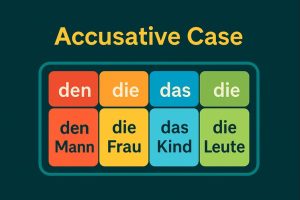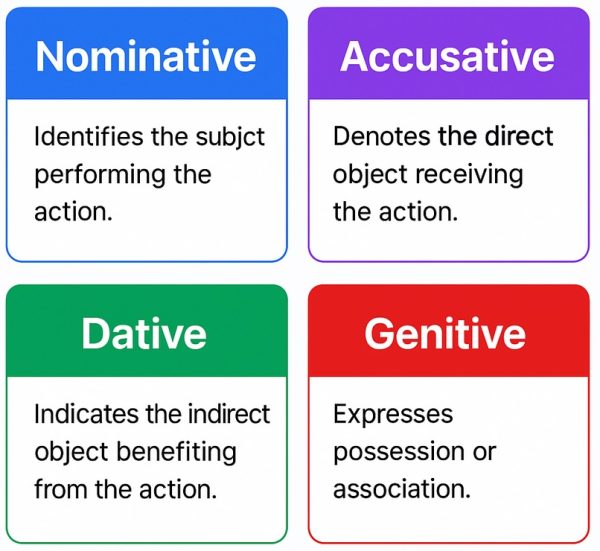What is the Accusative Case in German: Free Interactive Trainer & Clear Guide
Feeling confused about when “der Mann” suddenly becomes “den Mann”? You’re not alone! Welcome to the Accusative case in German – a fundamental part of German grammar that often trips up learners. But don’t worry!
This clear guide will break down the accusative case in German step-by-step. We’ll cover:
- What the accusative case actually is .
- When you absolutely need to use it.
- How it changes articles and pronouns .
- Plenty of practical examples to see it in action.
- And the best part? You can immediately practice what you learn with our Free Interactive Accusative Trainer right here on this page!
Ready to finally conquer the accusative? Let’s dive in!
What IS the Accusative Casein German? (The Simple Explanation)
Think of the Accusative case in German as the “direct object” case.
In English, the direct object is the noun or pronoun that directly receives the action of the verb. Ask yourself: “Who or what is receiving the action?”
- I see the dog. (What do I see? The dog. -> “The dog” is the direct object.)
- She eats an apple. (What does she eat? An apple. -> “An apple” is the direct object.)
- He loves her. (Whom does he love? Her. -> “Her” is the direct object.)
The Accusative case in German serves the exact same purpose: it marks the noun or pronoun that is directly affected by the verb’s action.
- Ich sehe den Hund. (I see the dog.)
- Sie isst einen Apfel. (She eats an apple.)
- Er liebt sie. (He loves her.)
Understanding this core function is the first step to mastering the accusative case in German relies on.
When Do You NEED the Accusative Case in German?
This is the crucial part! There are specific situations – triggers – that demand the accusative case. Here are the most important ones:
1. The Direct Object of Most Verbs
This is the most common use. Many German verbs require their direct object to be in the accusative case. If you can ask “Whom?” or “What?” after the verb, and the answer is the noun in question, it’s likely accusative.
Here are some extremely common verbs that always take an accusative object:
- haben (to have) – Ich habe einen Bruder. (I have a brother.)
- sehen (to see) – Siehst du den Vogel? (Do you see the bird?)
- hören (to hear) – Wir hören die Musik. (We hear the music.)
- lesen (to read) – Er liest das Buch. (He reads the book.)
- schreiben (to write) – Ich schreibe eine E-Mail. (I am writing an email.)
- essen (to eat) – Sie isst den Apfel. (She eats the apple.)
- trinken (to drink) – Er trinkt den Kaffee. (He drinks the coffee.)
- kaufen (to buy) – Wir kaufen das Auto. (We are buying the car.)
- brauchen (to need) – Ich brauche deine Hilfe. (I need your help.)
- suchen (to look for) – Er sucht seinen Schlüssel. (He is looking for his key.)
- finden (to find) – Sie findet die Lösung. (She finds the solution.)
- möchten (to would like) – Ich möchte einen Tee. (I would like a tea.)
- lieben (to love) – Er liebt seine Frau. (He loves his wife.)
- hassen (to hate) – Sie hasst Spinnen. (She hates spiders.)
- besuchen (to visit) – Wir besuchen unsere Oma. (We are visiting our grandma.)
- fragen (to ask) – Ich frage den Lehrer. (I ask the teacher.)
- verstehen (to understand) – Verstehst du mich? (Do you understand me?)
- kennen (to know – people/places) – Kennst du diesen Film? (Do you know this film?)
2. After Specific Accusative Prepositions
Some German prepositions always force the noun or pronoun that follows them into the accusative case, no matter what verb is used. Memorize this core group:
- durch (through) – Wir gehen durch den Park. (We are walking through the park.)
- für (for) – Das Geschenk ist für dich. (The present is for you.)
- gegen (against, around – time) – Er fährt gegen den Baum. (He drives against the tree.) Wir kommen gegen 10 Uhr. (We’re coming around 10 o’clock.)
- ohne (without) – Ich kann nicht ohne meinen Kaffee leben. (I can’t live without my coffee.)
- um (around, at – time) – Die Katze läuft um den Tisch. (The cat walks around the table.) Der Film beginnt um 8 Uhr. (The film starts at 8 o’clock.)
(Mnemonic Tip: Think DOGFU or FUDGO to help remember durch, ohne, gegen, für, um!)
Other Situations (Briefly):
- Certain Time Expressions: Some expressions of definite time use the accusative, like jeden Tag (every day), letzten Montag (last Monday), diesen Abend (this evening).
- Two-Way Prepositions: Prepositions like in, an, auf, über, unter, vor, hinter, neben, zwischen can take either Accusative or Dative. They take Accusative when there’s motion towards a location or destination (answering Wohin? – Where to?). This is a bigger topic, often covered separately. (Optional: Link to a post on two-way prepositions if you have one).
How Does the Accusative Change Things? (The Declensions)
Okay, you know when to use it. Now, how do words change?

The most important rule to remember: The biggest, most visible change happens with MASCULINE nouns (words that use “der”). Feminine (“die”), Neuter (“das”), and Plural (“die”) often look the same in the Accusative as they do in the Nominative (subject) case, especially their articles. This simplifies things a lot!
Let’s look at the changes:
Definite Articles (the)
| Case | Masculine | Feminine | Neuter | Plural |
| Nominative | der | die | das | die |
| Accusative | den | die | das | die |
| Example | der Mann → den Mann | die Frau → die Frau | das Kind → das Kind | die Leute → die Leute |
See? Only masculine “der” changes to “den”!
Indefinite Articles (a/an) & Kein (no/not a)
| Case | Masculine | Feminine | Neuter | Plural |
| Nominative | ein | eine | ein | keine |
| Accusative | einen | eine | ein | keine |
| Example | ein Hund → einen Hund | eine Katze → eine Katze | ein Buch → ein Buch | keine Kinder → keine Kinder |
| Nominative | kein | keine | kein | – |
| Accusative | keinen | keine | kein | – |
| Example | kein Stift → keinen Stift | keine Ahnung → keine Ahnung | kein Problem → kein Problem | – |
Again, the key change is masculine “ein” → “einen” and “kein” → “keinen”. (Possessive adjectives like mein, dein, sein follow the same pattern as ‘ein’/’kein’: meinen, deinen, seinen in masc. accusative).
Personal Pronouns
Pronouns change more noticeably.
| Case | I | you (inf.) | he | she | it | we | you (pl. inf.) | they/you (formal) |
| Nominative | ich | du | er | sie | es | wir | ihr | sie/Sie |
| Accusative | mich | dich | ihn | sie | es | uns | euch | sie/Sie |
Memorize these accusative forms: mich, dich, ihn, sie, es, uns, euch, sie/Sie. Notice ‘sie’ (her/them) and ‘es’ (it) don’t change from Nominative to Accusative.
Practice Time! Your Free Accusative Case in German Trainer
Theory is one thing, but practice makes perfect! Ready to test your understanding of the accusative case in German?
Use our interactive trainer below. Read the sentence, look at the hint, and choose the correct accusative article or pronoun from the dropdown. Get instant feedback and explanations to solidify your learning!
Try it now and see how you do!
Dative Case Trainer
Common Mistakes for the Accusative Case in German & Quick Recap
As you practice, watch out for these common pitfalls:
- Forgetting the Masculine -n: The most frequent error! Remember den, einen, keinen, meinen, deinen, seinen, ihren, unseren, euren, Ihren and ihn.
- Mixing up Prepositions: Using accusative after a dative-only preposition (like mit or zu) or vice-versa. Keep the preposition lists separate in your mind.
- Confusing Pronouns: Mixing up ihn (Accusative ‘him’) with ihm (Dative ‘him’), or sie (Acc. ‘her/them’) with ihr (Dative ‘her’).
Quick Recap:
- Use Accusative for the Direct Object (receives the action).
- Use Accusative after prepositions: durch, für, gegen, ohne, um.
- The main article change is Masculine: der → den, ein → einen, kein → keinen, mein → meinen, etc.
- Memorize pronoun changes: ich → mich, du → dich, er → ihn, wir → uns, ihr → euch.
Mastering the accusative case German requires understanding its function and practicing its forms. By recognizing direct objects and memorizing the key prepositions and declension patterns (especially for masculine nouns!), you’ll build more accurate and natural-sounding German sentences.
Don’t forget to use the interactive trainer above regularly to drill these concepts until they become second nature.
What part of the accusative case do you find most challenging? Share your thoughts or questions in the comments below!
We have another tool
This helps with understanding the different declensions
Click here for the tool

Practice Makes Perfect
Becoming Fluent In German: 180 Intermediate Short Stories
Complete German Grammar, 2nd Edition
Clicking and purchasing through these links supports our site and helps us continue creating fun, effective learning experiences without any cost to you—Danke schön!
Try Our Other German Learning Games
Now that you’ve had a blast with our crosswords, why not try our other games to boost your German skills even more? Explore additional challenges, expand your vocabulary, and enjoy every step of your language journey!
When do you use the accusative case in German?
What are the most common accusative prepositions in German?
• Ich gehe durch den Park.
• Das Geschenk ist für dich.
How do German articles change in the accusative case?
• der → den (ich sehe den Mann)
• die → die (ich sehe die Frau)
• das → das (ich sehe das Kind)
• ein → einen (ich habe einen Stift)
Can you give real‑world examples of the German accusative case?
2. We will visit the zoo tomorrow. (Wir besuchen den Zoo morgen.)
Each underlined noun is in the accusative as a direct object.
Where can I practice free German Akkusativ Übungen?
Or download the PDF worksheet in the resources section below.
What’s the difference between accusative and dative cases in German?
I see the dog. (Ich sehe den Hund.)
• Dative marks the indirect object (wem?):
I give the dog the food. (Ich gebe dem Hund das Futter.)

